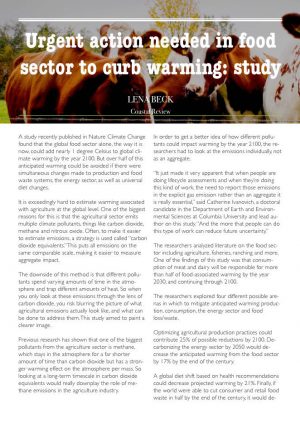 A study recently published in Nature Climate Change found that the global food sector alone, the way it is now, could add nearly 1 degree Celsius to global climate warming by the year 2100. But over half of this anticipated warming could be avoided if there were simultaneous changes made to production and food waste systems, the energy sector, as well as universal diet changes.
A study recently published in Nature Climate Change found that the global food sector alone, the way it is now, could add nearly 1 degree Celsius to global climate warming by the year 2100. But over half of this anticipated warming could be avoided if there were simultaneous changes made to production and food waste systems, the energy sector, as well as universal diet changes.
It is exceedingly hard to estimate warming associated with agriculture at the global level. One of the biggest reasons for this is that the agricultural sector emits multiple climate pollutants, things like carbon dioxide, methane and nitrous oxide. Often, to make it easier to estimate emissions, a strategy is used called “carbon dioxide equivalents.” This puts all emissions on the same comparable scale, making it easier to measure aggregate impact.
The downside of this method is that different pollutants spend varying amounts of time in the atmosphere and trap different amounts of heat. So when you only look at these emissions through the lens of carbon dioxide, you risk blurring the picture of what agricultural emissions actually look like, and what can be done to address them. This study aimed to paint a clearer image.
Previous research has shown that one of the biggest pollutants from the agriculture sector is methane, which stays in the atmosphere for a far shorter amount of time than carbon dioxide but has a stronger warming effect on the atmosphere per mass. So looking at a long-term timescale in carbon dioxide equivalents would really downplay the role of methane emissions in the agriculture industry.
In order to get a better idea of how different pollutants could impact warming by the year 2100, the researchers had to look at the emissions individually, not as an aggregate.
“It just made it very apparent that when people are doing lifecycle assessments and when they’re doing this kind of work, the need to report those emissions in the explicit gas emission rather than an aggregate it is really essential,” said Catherine Ivanovich, a doctoral candidate in the Department of Earth and Environmental Sciences at Columbia University and lead author on this study. “And the more that people can do this type of work can reduce future uncertainty.”
The researchers analyzed literature on the food sector including agriculture, fisheries, ranching and more. One of the findings of this study was that consumption of meat and dairy will be responsible for more than half of food-associated warming by the year 2030, and continuing through 2100.
The researchers explored four different possible arenas in which to mitigate anticipated warming: production, consumption, the energy sector and food loss/waste.
Originally published
by Coastal Review
March 30, 2023

